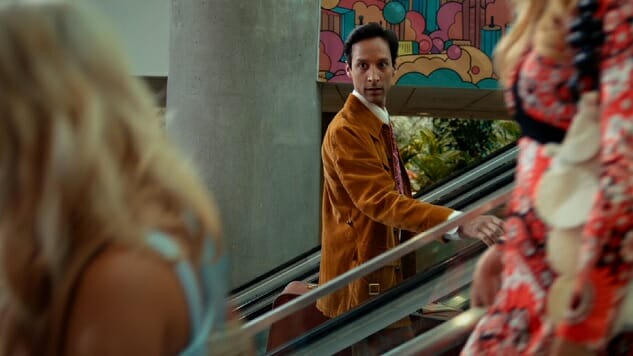The Tiger Hunter

When Aziz Ansari wrote “Indians on TV,” the fourth episode in the first season of his superb Netflix series, Master of None, he wrote it to critique projects like The Tiger Hunter: innocuous entertainments featuring American-born actors of Indian descent in roles that demand they affect Indian accents. Here, the actor is Community’s Danny Pudi, a native son of Chicago, cast as Sami, a lovesick Indian man who moves to America in 1979 to pursue a career in engineering and win the heart of his childhood love, Ruby (Karen David), in the process. If Ansari were to watch the movie, his eyes might roll out of their sockets at the blatant typecasting.
But Pudi isn’t Kal Penn, and The Tiger Hunter isn’t Van Wilder. It’s the product of Lena Khan, an Indian-American director out to subvert, or at least confront, that kind of stereotyping through comedy. In fact, Khan and her film nearly squeeze juicy commentary out of her casting choices by dovetailing those choices with a standard underdog plot, pitting a team of Indian expats against America’s grinding and backstabbing corporate sideshow as our heroes strive to perfect microwave technology for consumers. Stories of underestimated misfits and the establishment giants keeping them down are as American as frozen TV dinners. Casting an actor with American roots and asking him to adopt speech patterns that aren’t his own, then, becomes pseudo-commentary about what it means to be “a professional American.”
It’s a fine sentiment in an otherwise average movie. The Tiger Hunter’s name is derived from the lead character’s remembrances of his late father: Young Sami grew up in the shadow of his dear old dad, a renowned tiger hunter beloved by his village. (Occasionally, the movie flashes back to the past to recall sage advice passed down from sire to son, which by happy accident has universal application despite being packaged in the language of macho hunter’s wisdom.) Grown up, Sami tries to live by his father’s sterling example while attempting to impress Ruby’s dad, an intimidating and decorated general (Iqbal Theba), but after leaving India, he finds himself drowning in the inequities of life as an “other” in American capitalist culture. For all of his impressive qualifications, Sami can only find work drafting blueprints for which white men inevitably claim credit.
Pudi makes sense as Sami: He’s immediately likeable, charming, easy to root for, and he’s great either playing the straight man, or the fish out of water, or the punchline. Still, Khan, along with her co-writer, Sameer Asad Gardezi, puts too much of The Tiger Hunter’s burden on Pudi’s shoulders, saddling him with exposition in voiceover that reveals a weakness in her filmmaking. Without the voiceover, much of what we’re meant to understand about Sami’s philosophy on life would be lost; with the voiceover, we’re fed an overabundance of information we should be able to infer on our own. You do not watch The Tiger Hunter for its first 30 minutes or so as much as you listen to it, and the listening makes it something of a chore to sit through.